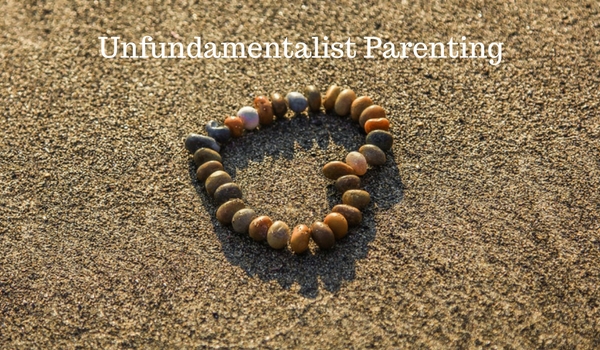Faith without doubt is dogma. It’s airtight, stale, and leads to death of the spirit. These are the hard lessons I have learned through the suffocation of faith shifting angst, breathing again only when I let my doubt poke holes into the box I had neatly housed God. A vibrant faith requires a healthy accompaniment of doubt so that our faith is always tested, transforming brittle doctrinal living into a resilient spirituality. Doubting our faith is never a display of weakness. On the contrary, it is a reflection of thoughtful devotion, that one is unafraid to choose again and again, what might be the next true step in their path.
And yet, the way Christian parents pass our faith down to our children is often filled with certainty. In order to be developmentally appropriate, we make simple faith statements without nuance, reducing the mysteries of God into kid-sized chunks that are easy to swallow. And in some ways, children require this of us—not yet mature enough to accept grey areas, they need us to provide reassurance of dogmatic certainty. They need tangible, clear, and concrete directives in how to connect with God.
This presents a grave concern: if we are dogmatic in our approach in sharing faith with the children, the likely result will be one of two unpleasant outcomes. First, we may be raising little Bible Thumpers and judgmental fundamentalists. Or, they could end up rejecting this rigid faith they find untenable with their own conscience and maturing ideas.
For Christian parents wishing to pass on a resilient faith, it is important to keep the end goal in mind. Do you want your children to grow up regurgitating systematic theology that were forced upon them in the vulnerability of their childhood? Or grow into a mature adult, capable of navigating the world as a citizen of integrity and a sensitivity to spirituality that bears much fruit? Is it possible to do the latter while meeting the developmental needs of our young but growing children?

Image: Pixabay
I believe so but our parenting has to be undergirded by two principles: love and agency.
If we are to be dogmatic, and if our children require it of us, then let us be fundamentalists about love. We do our very best to provide an environment in which they are assured over and over again of their value and worth. You can use elements of Christian practices, such as Bible reading, prayer, and church attendance, to reinforce that love, but we must be responsible to vet these influences in our children’s lives to ensure it is a loving place. Because unfortunately, as witnessed from stories of child abuse scandals in religious institutions, many churches are not safe havens for children.
But at the end of the day, none of these are requirements to show your children love. There may be many reasons Christian parents aren’t comfortable with reading the Bible—perhaps they are struggling with violent passages in Scripture, or are simply untrained in responsible readings of Scripture. There may be many of us who are faith shifting and feel triggered by the evangelical prayer practices of our youth. Perhaps some of us live overseas or are in areas where there aren’t viable churches to attend. Good news: God exists beyond religious institutions wherever love reigns. What forms the children above all will be the love that is demonstrated and delivered to them, not the number of memory verses or catechism recitations. So use very simple and developmentally appropriate ways to love each of your children the way they feel loved most. In this way, you are passing on the most important aspect of your faith—certainty of love.
When we’ve established that foundation of love, we can begin giving them tools and language to express their faith. For Christian parents, the value in passing on Christian traditions is to give them the benefit of the rich cloud of witnesses and practice rituals flush with meaning. However, it should be a priority for us to protect and maintain our children’s agency in these rituals. Don’t spoon-feed Scripture, invite them to engage with it. Never shackle prayer with legalism, simply create space for our children to speak and listen. I believe God is in the business of collaborating with us and future generations to shape our rituals. Therefore, we must pay attention to these conferences God is holding with our kids. What is God saying? What are our children saying? What are our children saying through God? What is God saying through our children? Give our children freedom to explore beyond formulaic prayers, read more than one version of the Bible, and visit different churches. In this way, they are practicing spirituality while maintaining their agency and voice, slowly learning to take charge of their own relationship with God.
Just as all parents learn to let go of their children, as Christians, we must also release their journey of faith. As they grow into adolescence and young adulthood, allow doubt and questions to press in on their faith. Give them the opportunity to test their faith, to wonder whether God is real, who Jesus means to them, and whether to continue walking the path of Christianity. Get to a place where it is completely okay with yourself if they do not choose your faith for their own. Only then, will they truly have permission from you to decide beyond your influence. Only then, will the faith they choose be authentic.
They may still walk away from faith, but we will have offered them the choice of following a loving and power-giving God.












